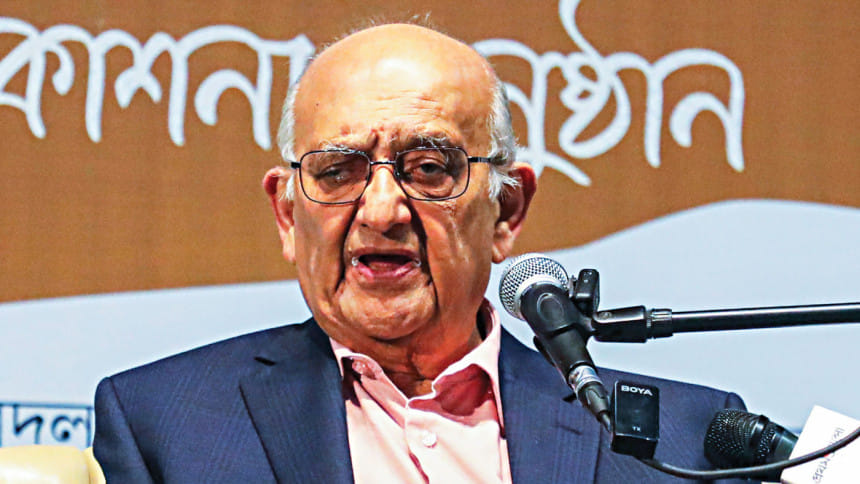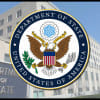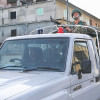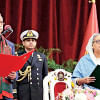Country facing a third election with clearly predictable outcome

Bangladesh is facing the possibility of a third election in which the basic preconditions for a competitive and inclusive election are not really going to be fulfilled, eminent economist Professor Rehman Sobhan said yesterday.
"Now, needless to say, the reasons which have never been entirely made clear we chose to do away with the system of caretaker governments," he said at a book launch at the capital's Bangla Academy.
"And the outcome, of course, has been visible enough. We had two elections, whose credibility has certainly been questioned, not just here, but internationally. And we are now facing the possibility of an election again, whose outcome is very clearly predictable.
"Obviously, the major opposition party is incarcerated or is in a fugitive condition. And the only contestants are going to be people from the ruling gharana, or people who are uncertain about their political identity, and what you may see a genus-like face where it's one side of your face, you are the opposition, and the other, you are the election partner, where you solicit for being gifted seats to contest the election. No one can take that sort of political party very seriously.
The books unveiled at the event were Ekattorer Dinponji: Muktijuddher Dainik Ghotonalipi edited by Sajjad Sharif and Muktijuddhe Shahid Buddhijibi: Smriti Jibon Juddho edited by Anisul Hoque.
As the featured speaker at the event organised by Prothom Alo, Prof Sobhan delivered a speech titled Obyahata Muktijuddho which translates as Continued Liberation War.
"We should keep in mind that the liberation struggle itself originated in the attempt to build a democratic society in the denial of democracy, which was a singular element in the creation and perpetuation of economic disparities, and the political injustice, because in order to create that unequal society, it could only be done through a process of denial of democracy," he said.
"So, looking at the state of democracy, we see that over a 52-year period, we have not really been able to consolidate and build a sustainable democratic system in a culture in our society.
"After 52 years, we are still trying to work out an acceptable system of holding elections. Who would have thought that this would be a matter of central concern? Our inability to construct a workable system of holding elections has led again to a process in which throughout the decade of the -- it is in periods of cantonment rule -- you had a situation in which the concept of a free and fair election became completely alien to our consciousness.
"And it required a massive political mobilisation to eventually get us back on the democratic path. I remember when I used to meet colleagues from Pakistan, in the course of the 1980s, one of the first things they would always tell me is that how is it possible that after all those years of struggle in Bangladesh, you have ended up being ruled by the cantonment? You can understand this happening in Pakistan, how did it happen in Bangladesh? I must say that I could never provide a very satisfactory answer at that time.
"But then, we went through what we believe was our second liberation and democratic renaissance in 1991. And our expectation was that this would lead to a new age for us. I participated in the first caretaker government at that time under Justice Shahabuddin. Our whole experience was, at that time, a largely experimental experience. We did not really expect nor were we sure how this would work out. But I remember Nikhil Chakravarty, the editor of Mainstream, one of the leading left magazines in India, who came as an election observer, pointing out that that election, of which he was there as an observer, was probably the freest and fairest election he had actually witnessed in his whole life. He was then in his 70s.
"The experience with that inspired the struggle by Sheikh Hasina for establishing a system, institutionalising the system of elections under a caretaker government. And the end result of a two-year political struggle was the enactment of a constitutional amendment for elections under a caretaker government.
"That was a campaign led by the current prime minister and a broad spectrum of the political opposition at that time. And it was in order for that to come about, it required a consensus between the two main parties, the Awami League and the BNP, and that itself was a singular achievement.
"The establishment of a system of elections under the caretaker system, of course, led to the holding of relatively free and fair elections. I mean, people may debate how free or fair elections actually are, but for me, I have two yardsticks for free and fair elections.
"One would be that it is contested by two or three major parties. They confront with the possibility of capturing state power, and because they are major contestants, the outcome of the election process will remain uncertain right to the end.
"The moment predictability is introduced into an election process, you have doubts about the credibility of that process. And of course, the second and most relevant outcome is whether the incumbent government is then displaced and the opposition party then ascends to power. If you look at the elections of 91, if you look at the elections of 96, 2001 and of 2009, in all those cases of elections under caretaker government, the opposition party actually came in office."
Prof Sobhan also observed how the country progressed in the decades following its independence.
"Looking back 52 years, at the conditions which prevailed at the time of our liberation, and even looking back another 25 years, we should recognise that quite significant transformations have been registered. I identified some of the critical elements of our advance. If you remember, a great deal of the struggle at that time was all about the wide economic disparity which existed…. Now, if you look at the numbers today, our per capita income is about 60 percent ahead of Pakistan. Our GDP, which was again significantly behind Pakistan at that time, I think is also now significantly moved ahead.
"And in many other developmental indicators... we have advanced very significantly. And in some areas, we have even moved ahead of India.... During the Covid period, some numbers were even been presented that our per capita income had even crossed India's and certainly in terms of the progress in our human development indicators, whether we are talking about healthcare, whether we're talking about education, whether we are talking about gender, advancement of women, in all these areas.
"Amartya Sen and his colleagues have actually written and commented on the fact that we have moved ahead of India in these areas. So, Pakistan itself is a long way behind us now. And if you look at the comparison of the trends in the Pakistan economy compared to us, anyone who has talked to Pakistanis recently, particularly economists, are all deeply conscious of how well we have advanced compared to them."

 For all latest news, follow The Daily Star's Google News channel.
For all latest news, follow The Daily Star's Google News channel. 








Comments